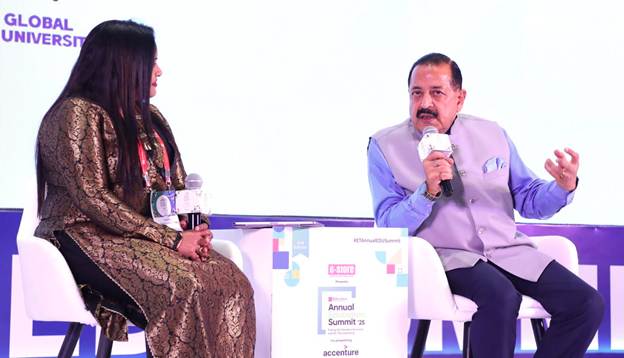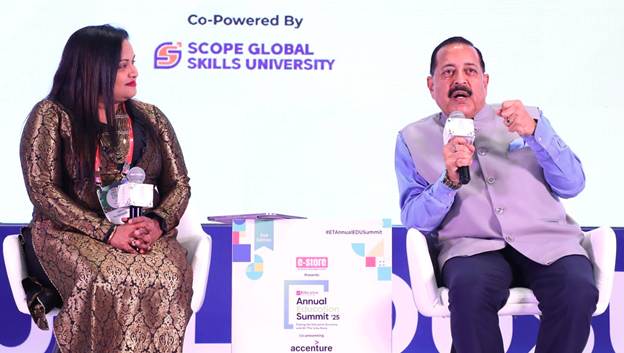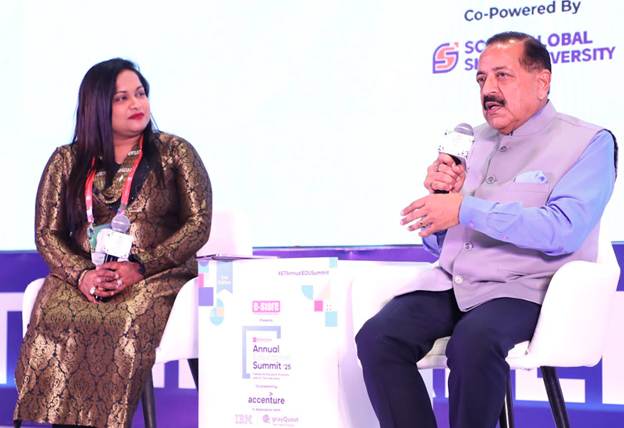Department of Space
"Last 11 Years saw technology entering Every Indian Household," says Union Minister Dr. Jitendra Singh
"Operation Sindoor" is a testimony to the scientific advancement and capacity-building gained in the last 11 years, which had enabled India to counter drone and missile attacks effectively: Dr Jitendra Singh
Rise of Aspirations Driven by Science, Tech, and Innovation Reflects Ease of Living and Ease of Doing Research: S&T Minister
India’s Ascent to Fourth-Largest Economy and beyond Will Be Powered by Space and Biotechnology Sectors: Dr. Jitendra Singh
India’s Space Economy to Grow Five-Fold from $8 Billion to $44 Billion in Coming Years: MoS, Space
Posted On:
19 JUN 2025 5:57PM by PIB Delhi
In an exclusive thought-provoking conversation at the "Economic Times Education Summit 2025" today in New Delhi, Union Minister of State (Independent Charge) for Science and Technology; Earth Sciences and Minister of State for PMO, Department of Atomic Energy, Department of Space, Personnel, Public Grievances and Pensions, Dr. Jitendra Singh declared that the last 11 years under Prime Minister Narendra Modi had witnessed a revolutionary transformation in India’s scientific temperament and technological outreach, with technology entering virtually every Indian household.
Reiterating India’s self-reliant capabilities, Dr. Jitendra Singh referred to the success of "Operation Sindoor" and said it was a testimony to the scientific advancement and capacity-building gained in the last 11 years which had enabled India to counter drone and missile attacks effectively.
“There was never a lack of talent in this country. What we lacked was an enabling environment to nurture it. PM Modi’s visionary leadership over the past decade has created that enabling ecosystem,” said Dr. Jitendra Singh.
Crediting the Prime Minister’s out-of-the-box decisions like the unlocking of the space and nuclear sectors, Dr. Jitendra Singh said, these reforms have had a multiplier impact across diverse areas including agriculture, education, defence, land record management, disaster preparedness, and e-governance.

Highlighting the emergence of India as a hub of aspirational youth powered by Science, Technology and Innovation, Dr. Jitendra Singh remarked:
“The rise of aspirations enabled by science and innovation is testimony to the Ease of Living as well as the Ease of Doing Research. Indians abroad today wear their identity with pride, and the world respects that.”
Responding to questions on India’s growth trajectory, Dr. Jitendra Singh stated “India’s rise to the position of the fourth-largest economy and beyond will be driven by our Space, marine and biotechnology sectors.”
The Minister highlighted the recently launched BIO-e3 Policy, emphasizing a triple focus on Economy, Employment, and Environment, calling it the herald of a biotech-driven revolution.
He further noted India’s leadership in preventive healthcare, including the development of the world’s first DNA-based COVID-19 vaccine and executing the largest vaccination drive globally.

Dr. Jitendra Singh drew attention to India's remarkable strides in space exploration, stating: “Even though we were late starters, India became the first nation to reach the South Pole of the Moon with Chandrayaan-3.”
He highlighted India’s rising stature with the upcoming Axiom-4 mission, where Group Captain Shubhanshu Shukla will serve as Mission Pilot and represent India as an equal global partner aboard the International Space Station (ISS).
The Axiom-4 mission will feature indigenous biotechnology experiments—developed jointly by ISRO and the Department of Biotechnology—focusing on space nutrition and self-sustaining life support systems using specially designed microgravity-compatible biotech kits.
“These kits have been conceptualized and validated by Indian scientists and will lay the foundation for long-duration human spaceflight research,” he said.
The Minister also revealed that India’s space economy, currently valued at $8 billion, is projected to grow five-fold to $44 billion in the near future.
India now boasts over 300 space startups, up from single digits in 2014, with several having global potential. He shared that space medicine will be the next frontier, where India is already making breakthroughs.
Dr. Jitendra Singh strongly emphasized the role of technology in citizen-centric governance, citing examples such as Face Recognition Technology for Pensioners, which allows senior citizens to verify their identity with just a phone and camera, eliminating physical hardships and CPGRAMS, India’s flagship public grievance platform, which has evolved into a global model.
“In 2014, we handled around 2 lakh grievances annually. Today, that number stands at 26 lakh,” he noted.

However, he cautioned against an over-reliance on AI-only models and proposed a hybrid model that optimally blends Artificial Intelligence with human intelligence to retain empathy and integrity in public service delivery.
“India has matured into a nation where scientific research is not just academic—it’s strategic, secure, and sovereign,” he concluded.
****
NKR/PSM
(Release ID: 2137740)
Visitor Counter : 221